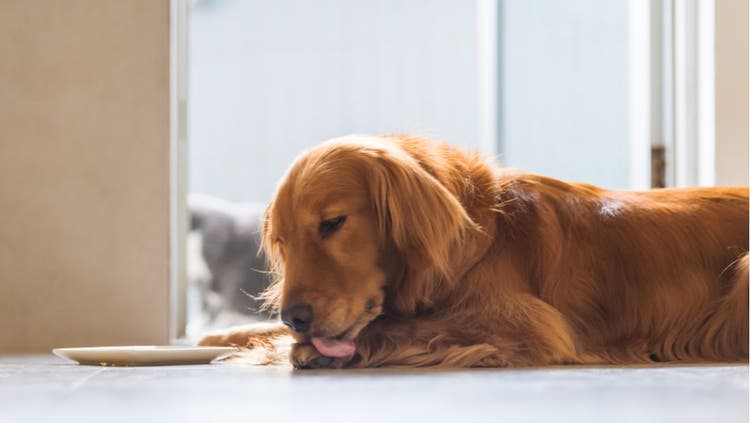
Why Does My Dog Lick His Paws?
The occasional cleaning or licking of the paws is considered normal behavior for a dog, but if you notice your pet licking or focusing on their paws more than normal, it may be cause for concern. One clue that your pet is licking more than normal is a reddish-brown staining of the hair on the paws (see Figure 1). There is an enzyme in the saliva called porphyrin that stains the hair when an animal is licking an area excessively.
In addition to licking, many dogs will aggressively chew on their paws, which may lead to ulcers or crusting on the paw pads or staining of the claws, which can also lead to sensitivity of the feet or noticeable sores. Finally, many owners whose pets are excessively licking will note that the licking and chewing behavior will interfere with the pet’s normal routine, including sleep. This can also affect the owner’s sleeping schedule, since the sound of their pet licking themselves throughout the night can be irritating.
Figure 1. “a reddish-brown staining of the hair on the paws”
Why Dogs Lick Their Paws?
It is a common misconception that dogs will lick their paws because they are nervous or they find it comforting and do it out of habit. The most common reason pets lick their paws is because they are itchy or painful.
There are several types of allergies in dogs including food allergies, flea allergies, and environmental allergies. Atopic dermatitis is a type of environmental allergy that dogs can develop to pollen, molds, dander, and other environmental allergens. Dogs absorb allergens transcutaneously (through the skin), which triggers an immune response leading to skin inflammation and a subsequent desire to itch.
The paws are commonly affected by allergic inflammation. Unlike itchy people who scratch an affected area, itchy dogs will lick, bite, and chew in addition to or instead of scratching. Other less common triggers of paw licking include parasitic infestations or immune mediated diseases that target the claws or paw pads.
Is Excessive Licking Just Annoying or Potentially Harmful?
As mentioned above, licking or chewing of the paws can lead to damage of the paw pads or create sores elsewhere on the paws, which can lead to pain and sensitivity. Additionally, the increased moisture from the excessive licking and the inflammation from the underlying trigger can lead to an environment which promotes the development of secondary bacterial or yeast infection.
Signs of secondary infection can be a stinky, bad odor from the paws, increased tenderness, pus or increased debris in between the toes, and/or increased desire to lick and chew on the paws.
How Do I Stop My Pet from Licking?
It is important to figure out the underlying trigger to help direct therapy in order to stop the chronic licking and prevent secondary issue. Most veterinarians will evaluate for inflammation (redness) of the feet, evaluate the nails and paw pads, and check for secondary infections or parasites. If allergies are suspected, there are numerous treatment options available. One of the safest and easiest things to start with are paw rinses or wipe downs. Wiping down the paws will help decrease allergen carriage on the skin.
If appropriate, a veterinarian may also recommend an antihistamine or other anti-itch medications for treatment of atopic dermatitis. If the veterinarian suspects an immune mediated disease, a biopsy (deep tissue sample) may be recommended to help direct therapy. In most cases, treating the underlying disease will stop the desire to itch and subsequently allow the affected area to heal. Ultimately, once you have a diagnosis and treatment plan, you and your pet can get back to putting your best paw forward.